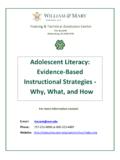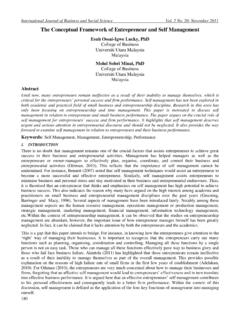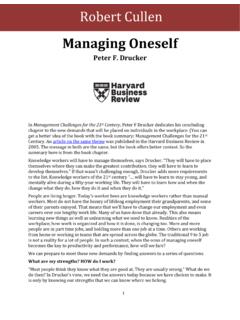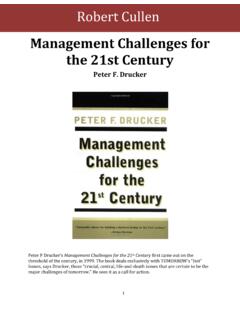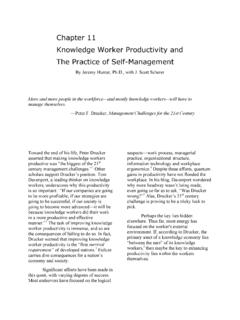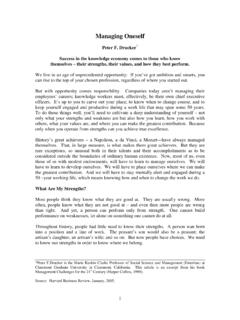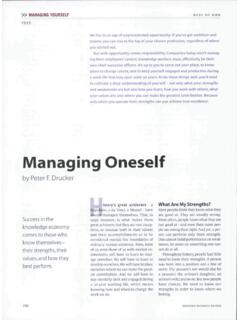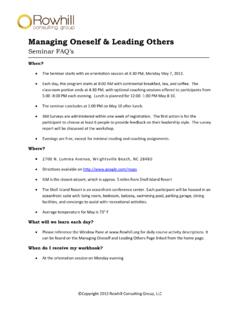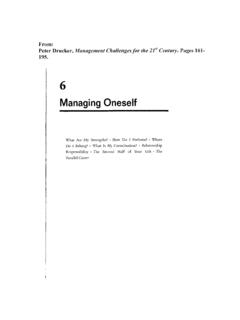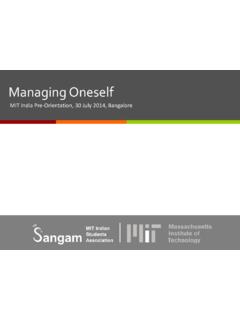Transcription of Swimming in the Deep End – Breakout Session Managing ...
1 Swimming in the Deep End Breakout Session Managing Resistance and Managing oneself Agenda Overview of Session Got Resistance? How To Respond Abrams What Do I Say If? Body Language Reminders How To Manage oneself In the Deep End Ways to Manage Yourself -Abrams Learned Optimism and VIA Strengths, Etc. Self-Assessment Final Reflection Jennifer Abrams, Communications Consultant @jenniferabrams Jennifer Abrams, the Presenter Jennifer Abrams is an international educational and communications consultant for public and independent schools, hospitals, universities and non-profits. Jennifer trains and coaches teachers, administrators, nurses, hospital personnel, and others on new employee support, supervision, being generationally savvy, having hard conversations and collaboration skills. In Palo Alto USD (Palo Alto, CA), Jennifer led professional development sessions on topics from equity and elements of effective instruction to teacher leadership and peer coaching and provided new teacher and administrator trainings at both the elementary and secondary level.
2 From 2000-2011, Jennifer was lead coach for the Palo Alto-Mountain View-Los Altos-Saratoga-Los Gatos Consortium s Beginning Teacher Support and Assessment Program. In her educational consulting work, Jennifer has presented at annual conferences such as Learning Forward, ASCD, NASSP, NAESP, AMLE, ISACS and the New Teacher Center Annual Symposium, as well as at the Teachers and Principals Centers for International School Leadership. Jennifer s communications consulting in the health care sector includes training and coaching work at the Community Hospital of the Monterey Peninsula and Stanford Hospital. Jennifer s publications include Having Hard Conversations, The Multigenerational Workplace: Communicating, Collaborating & Creating Community and Hard Conversations Unpacked the Whos, the Whens and the What Ifs, Her upcoming book, tentatively titled, Swimming in the Deep End: Leadership Skills for Aspiring and Emerging Leaders, will be out early in 2019.
3 Other publications include her chapter, Habits of Mind for the School Savvy Leader in Art Costa s and Bena Kallick s book, Learning and Leading with Habits of Mind: 16 Essential Characteristics for Success, and her contribution to the book, Mentors in the Making: Developing New Leaders for New Teachers published by Teachers College Press. Jennifer writes a monthly newsletter, Voice Lessons, available for reading at and subscribing to on her website, and is a featured columnist, writing about The Deep End at as well as about personal growth and development at Jennifer has been recognized as one of 21 Women All K-12 Educators Need to Know by Education Week s Finding Common Ground blog, and the International Academy of Educational Entrepreneurship s 2015 Entrepreneur of the Year. She has been a featured interviewee on the topic of professionalism for ASCD s video series, Master Class, hosted by National Public Radio s Claudio Sanchez, and in the lead article, Finding Your Voice in Facilitating Productive Conversations for Learning Forward's The Leading Teacher, Summer 2013 newsletter; as a generational expert for "Tune in to What the New Generation of Teachers Can Do," published in Phi Delta Kappan, (May 2011), and by the Ontario Ministry of Education for their Leadership Matters: Supporting Open-to-Learning Conversations video series.
4 Jennifer considers herself a voice coach, helping others learn how to best use their voices - be it collaborating on a team, presenting in front of an audience, coaching a colleague, supervising an employee and in her new role as an advisor for Reach Capital, an early stage educational technology fund. Jennifer holds a Master s degree in Education from Stanford University and a Bachelor s degree in English from Tufts University. She lives in Palo Alto, California. Jennifer can be reached at , and on Twitter Jennifer Abrams, Jennifer Abrams, On 3 Key Deep End Skills Thinking Before You Speak/Planning Before Beginning + - Do I know what challenges(s) this initiative is solving? Do I know if this challenge is actually a polarity that needs to be managed instead of a problem being solved?
5 Can I speak to this difference? Do I know what I value and how this project aligns with the values I hold? Do I know what the values are of my school and district and can I communicate how this initiative aligns with those values? Can I tell a story about this challenge so others will feel the need for this initiative to move forward? Can I share data, evidence or research about this challenge so others will understand the need for this initiative to move forward? Who needs to be involved in the planning of this initiative? Do I know how to get other s input in a way that is useful for me and seen as worthwhile for them? Do I have good facilitation skills and know how to lead dialogue sessions as well as decision-making sessions? Do I have decision-making processes available to me? Do I know what my action plan is for implementation?
6 Do I have a communication plan in place for explaining the initiative, the plan for implementation and what s coming next? Am I aware that there may be covert processes at work that I might not be able to address? Pre-Empting Resistance and Responding to Resistance Do I know what questions and concerns most commonly come up with a new initiative and how might I address them early in the roll out process? Do I know the people I am working with in some personal way? (Ages, family status, ethnicity, etc? Am I aware of adult learning theory and how it might connect to the initiative being implemented? Do I know about psychological fight or flight instincts in all adults so that I can mitigate for those fears in terms of my communications? Am I mindful that others are at different developmental stages in their own growth and need to be communicated with differently?)
7 How might this initiative challenge them and how might you support them to move forward with the initiative? Given that resistance will happen, do I know ways I can professionally respond to those who will respond negatively to the initiative? Do I have an awareness of how my body language is perceived so I am viewed as credible or approachable, as the situation requires? Jennifer Abrams, Jennifer Abrams, If They Say? - Possible Responses from Hard Conversations Unpacked What gives light must endure burning. Viktor Frankl The responses are a starting point. Mark Goulston, author of a Harvard Business Review blog, Don t Get Defensive: Communication Tips for the Vigilant might call these comments controlled confrontation responses. Use them as ideas to work with; to push back at; to rewrite. Make them work for you. Conflict Responses When you are intimidated by someone shouting, name-calling, swearing, threatening.
8 I am open to having this conversation and I know you are angry. And, I will not continue talking with you if you speak at that volume, swear at me, or use that language. Please stop and we can continue the conversation. I am having difficulty hearing your message because your tone of voice is too harsh for me to listen to. Would you please state your need in a more neutral tone? You have every right to feel that way, but no right to express it in an offensive manner. Please restate your objection in a more polite way. When someone responds with general words like never, always or every time instead of talking about a specific situation. While it may seem true that this happens all the time or that I never respond. The truth is that is not true. It is an over-generalization. Let s try to focus the conversation on this specific Jennifer Abrams, Jennifer Abrams, Jennifer Abrams, Jennifer Abrams, someone attacks your personality or identity instead of trying to solve the problem.
9 Remember that you agreed that you would focus on issues rather than personalities. If you can return to the issue at hand, we can continue this important discussion, otherwise I am going to ask that we stop now." When someone bring things up from the past that have nothing to do with the present conflict. I understand that there were experiences prior to this one that you feel have a connection with what we are talking about. At this point, that information isn t the focus of this current conversation. Let s direct our attention on this specific situation. When someone brings something up that is valid, but a completely different topic. I see two different topics are starting to be at play in this conversation. And I am not discounting your point. Both topics are important. Can we start with the topic we first started discussing and then, if we want, we go back to discuss the other?
10 When someone refuses to listen and acts as if this issue isn t worth talking about. From your vantage point, this might not seem like it is worthy of discussion. However, the impact this action has had on others has made it difficult for _____ to do her job. I have a responsibility to bring it up and as a professional on the team, you have a responsibility to engage with this information. When someone wants to be let off the hook Everyone is responsible for this work. While I understand your circumstances (share details), I also understand the need for the student (or the program) that this be finished. What can I do to support you because I am committed to making sure the work is done. Do you have some ideas as to how you can move forward? Jennifer Abrams, Jennifer Abrams, Jennifer Abrams, Jennifer Abrams, someone needs to push past the letter of the law to the spirit of the law I acknowledge you have done (explain what has been done).









